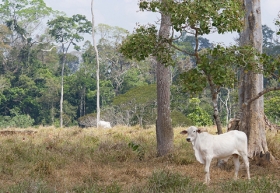US Pressured to Help Fight Tropical Deforestation

The state of Acre in western Brazil gained notoriety in 1988 when cattle ranchers murdered Chico Mendes, a rubber tapper who campaigned against the destruction of the Amazon forest.
Twenty years later, roughly half the state is marked as a protected area. The government continues to integrate conservation efforts into development plans, but total deforestation rates have still risen in recent years. To avoid further forest loss, the state is looking to assistance from outside funders.
Forest loss contributes nearly 20 percent of global greenhouse gas emissions, yet European cap-and-trade agreements and the Kyoto Protocol have largely refrained from including the forestry sector in market-based emissions offset programs.
The United States, which is looking for affordable strategies to reduce emissions, may be more willing. Governors of three U.S. states have signed cooperation agreements with eight regional leaders in Brazil and Indonesia to protect forests as part of their climate mitigation efforts. A cap-and-trade bill passed by the U.S. House of Representatives in May relied heavily on forestry offsets to reduce emissions 17 percent by 2020 from 2005 levels.
As the U.S. Senate prepares to debate its own climate change legislation, a chorus of politicians, businesses, environmentalists, and scientists is uniting to request that U.S. climate policy help tropical nations in Latin America, Africa, and Southeast Asia protect their forests. Known as the Commission on Climate and Tropical Forests, the group suggests that U.S. cap-and-trade legislation raise an annual $5 billion and $9 billion in public and private investments, respectively. Without forestry offsets, comparable domestic emissions reductions would cost the U.S. economy an additional $50 billion by 2020, the group estimates.
Carbon offsets are risky, however. The projects would provide funding in regions with poor environmental controls and high development pressures. Forests in particular are controversial. A fire or weather event could eliminate an offset project's stored carbon, and it is nearly impossible to verify that the amount of carbon stored in a forest is identical to the carbon emitted by an industrial polluter.
An assortment of 49 Brazilian environmental and social nongovernmental groups united this month to raise awareness about the risks of the Brazilian government participating in avoided deforestation programs. Current proposals do not clearly distinguish between the preservation of native forests and large-scale tree monocultures, and carbon offsets do not guarantee sufficient emissions reductions, the groups said.
"We run the risk of allowing industrialized countries not to reduce their fossil-fuel emissions drastically and to maintain an unsustainable production and consumption model," the group said in a statement. "We need agreements to force Northern countries to recognize their climate debt and to assume the commitment to pay it off."
Still, many scientists are calling for international and domestic climate policies to include measures that protect forests. Last month, more than 30 leading U.S. ecologists, biologists, and forestry scientists wrote a letter to President Barack Obama requesting that his administration support efforts to reduce emissions from deforestation and forest degradation.
"We write specifically to urge you to make the conservation and restoration of native forests in the tropics and sub-tropics a central pillar of U.S. climate policy," the letter said [PDF]. "Providing economic incentives for preservation of forests can play a critical role in achieving the early reductions needed to avert warming greater than 2 degrees Celsius."
The House climate bill relied on tropical forest measures for 43 percent of the legislation's proposed emission reductions. The bill would provide as much as $18 billion in new funding for tropical forest preservation each year by 2050 - a more than 100-fold increase from current funding levels. Most of those funds would derive from the sale of emission permits, decreasing from an initial 5 percent of the pollution allowances from 2012-25 to 2 percent after 2030.
A Senate cap-and-trade bill introduced earlier this month proposes to reduce short-term emissions 20 percent by 2020 compared to 2005. This greater emissions reduction goal would be met economically through a greater reliance on offsets, supporters argue. All regulated emitters could offset as much as 2 billion tons of greenhouse gases, rather than the 1.5 billion ton limit set by the House (half of which is expected to be forestry related). International programs would be limited to 37.5 percent of the total offsets allowed. The House imposed a 50-percent ceiling on foreign offsets.
Jeffrey Horowitz, founder of Avoided Deforestation Partners, an organization that lobbies for U.S. and international policies to preserve tropical forests, surveyed Congress members in February about paying tropical countries to avoid deforestation. He found that nearly one-third of respondents were dubious about whether the programs could truly reduce emissions. Several legislators also said that the policy appeared to be foreign aid packages masked as climate change solutions.
Since then, however, more legislators are supportive of avoided deforestation measures as more businesses join environmental groups to advocate for the inclusion of forestry offsets in a cap-and-trade bill, Horowitz said.
"Every business wants to know they can use forestry credits because of the affordability and its use as a cost containment measure, especially in the economy we're in now," he said. "This is no longer about treehugging. It's about economics."
Ben Block is a staff writer with the
Worldwatch Institute. He can
be reached at
bblock@worldwatch.org.
This article is a product of Eye on Earth, Worldwatch Institute's online
news service. For permission to reprint Eye on Earth content, please
contact Juli Diamond at
jdiamond@worldwatch.org.